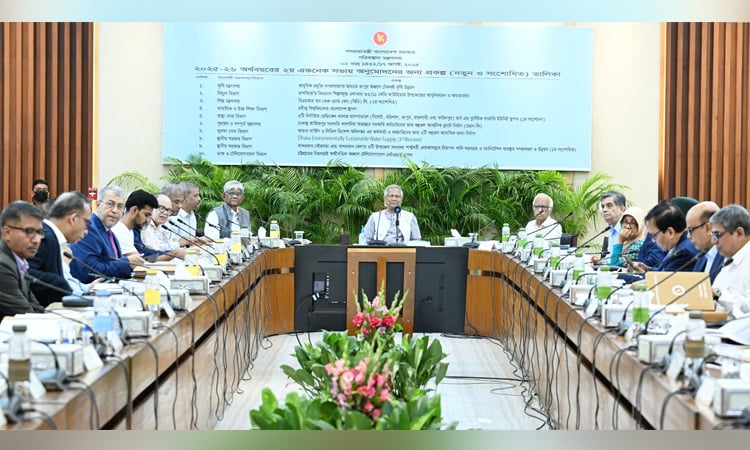The Executive Committee of the National Economic Council (ECNEC) has approved 10 development projects worth Tk 6,506.50 crore.
The meeting, chaired by Chief Adviser Professor Muhammad Yunus, held at the Planning Commission in the capital.
Of the total cost, Tk 3,821.58 crore will come from government funding, Tk 2,428.04 crore from project loans, and Tk 256.89 crore from agency’s own resources. The projects include five new initiatives, two revised projects, and three projects with extended timelines but no additional budget.
Planning Adviser Wahiduddin Mahmud; Law, Justice and Parliamentary Affairs and Expatriate Welfare and Overseas Employment Adviser Dr. Asif Nazrul; Home and Agriculture Adviser Lieutenant General Md Jahangir Alam Chowdhury (Retd); Industry and Housing and Public Works Adviser Adilur Rahman Khan; Power, Energy and Mineral Resources, Road Transport and Bridges and Railways Adviser Muhammad Fouzul Kabir Khan; and Environment, Forest and Climate Change, Water Resources Adviser Syeda Rizwana Hasan along with relevant officials attended the ECNEC meeting.
The approved projects include five new initiatives, two revised projects, and three projects with extended timelines but no additional budget.
Under the Ministry of Agriculture, the Sustainable Agricultural Development Project in the Rangpur region through the expansion of modern technology was approved, aimed at enhancing productivity and ensuring long-term agricultural sustainability in the region.
The Ministry of Power, Energy and Mineral Resources received approval for the modernisation and capacity expansion of 33/11 KV outdoor substations in existing industrial areas under BAPBIBO, which will improve power distribution and support industrial growth.
For the Ministry of Industry, the Board of Management Restructuring (BMR) of Keru and Co. (BD) Ltd was approved in its second revised form, focusing on upgrading industrial facilities and improving operational efficiency.
The Ministry of Education’s project for the establishment of Rabindra University Bangladesh was approved, providing a foundation for expanding higher education and research opportunities in the country.
The Ministry of Health and Family Welfare received approval for the establishment of burn and plastic surgery units in five designated medical colleges—Sylhet, Barishal, Rangpur, Rajshahi, and Faridpur—in its first revised form, aiming to improve specialised healthcare services across the regions.
Under the Ministry of Housing and Public Works, the construction of multistorey residential flats for government employees within Azimpur Government Colony in Dhaka (Zone-C) was approved to provide adequate housing facilities for public servants.
The Ministry of Home Affairs secured approval for the construction of two multistorey residential buildings for officers and staff of the Fire Service and Civil Defence Department, addressing housing needs for key emergency service personnel.
For the Ministry of Local Government, two projects were approved: the third revised Dhaka Environmentally Sustainable Water Supply project and the first revised project for the expansion and improvement of safe water supply and sanitation in Bandarban Municipality, three upazila headquarters of Bandarban district, and adjacent areas. These projects aim to ensure access to clean water and improved sanitation for local communities.
Finally, the Ministry of Post and Telecommunications received approval for a telecommunication network establishment project in the Mirsharai Economic Zone, Chattogram, intended to enhance connectivity and support the development of the economic zone.


